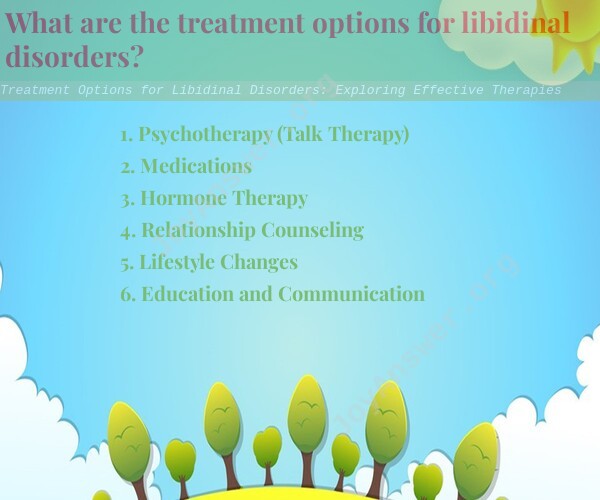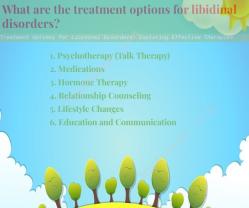What are the treatment options for libidinal disorders?
Libidinal disorders, also known as sexual disorders, can manifest in various ways, including hypoactive sexual desire disorder (lack of sexual desire), sexual aversion disorder (strong aversion or avoidance of sexual activity), and other sexual dysfunctions. Treatment options may vary depending on the specific disorder and its underlying causes. Here are some common treatment approaches:
1. Psychotherapy (Talk Therapy)
Psychotherapy, such as cognitive-behavioral therapy (CBT) or sex therapy, can be helpful in addressing libidinal disorders. It allows individuals to explore any psychological or emotional factors that might be contributing to the issue. Therapists can help identify and work through underlying concerns, improve communication, and offer strategies to enhance sexual desire and satisfaction.
2. Medications
In some cases, medications may be prescribed to address certain libidinal disorders. For example, selective serotonin reuptake inhibitors (SSRIs) or other antidepressants may be used to treat hypoactive sexual desire disorder or other sexual dysfunctions when related to depression or anxiety. However, the use of medications will depend on the individual's specific situation and should be prescribed and monitored by a healthcare professional.
3. Hormone Therapy
Hormone therapy may be considered if a hormonal imbalance is identified as the cause of the libidinal disorder. For example, hormone replacement therapy (HRT) might be prescribed for individuals experiencing low libido due to hormonal changes, such as menopause in women or low testosterone levels in men.
4. Relationship Counseling
If the libidinal disorder is affecting a romantic relationship, couples or relationship counseling can be beneficial. Addressing communication issues, emotional intimacy, and other relationship dynamics can positively impact sexual desire and satisfaction.
5. Lifestyle Changes
Adopting a healthy lifestyle can have a positive impact on sexual health. Regular exercise, a balanced diet, stress management, and adequate sleep can all contribute to overall well-being and potentially improve sexual desire.
6. Education and Communication
Educating oneself about sexual health and communication about needs and desires with a partner can be essential in addressing libidinal disorders. Open and honest discussions can lead to increased understanding and intimacy.
It's important to remember that each person's situation is unique, and treatment should be tailored to their specific needs. If you or someone you know is experiencing a libidinal disorder, seek guidance from a qualified healthcare professional or a mental health specialist. They can conduct a thorough assessment, provide a proper diagnosis, and recommend appropriate treatment options for the specific condition.


